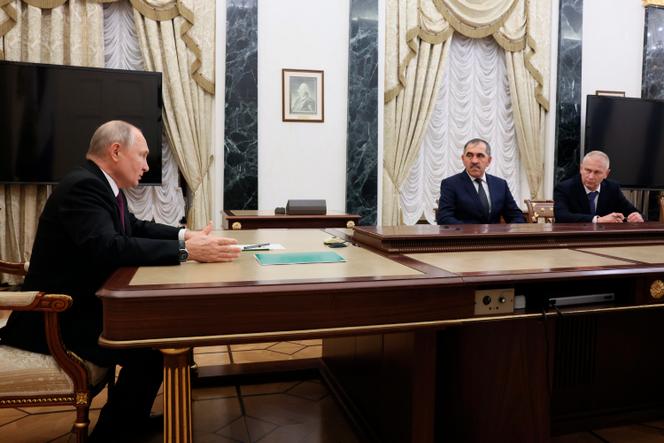
It is not often that Vladimir Putin is forced to repeat himself – even more so publicly. But that is exactly what the Russian president did on September 29, when he staged a reception at the Kremlin for Andrei Trochev, former chief of staff of the Wagner mercenary group. “Andrei Trochev will be involved in the training of volunteer units capable of carrying out various combat missions, mainly, of course, in the zone of the ‘special military operation’ [in Ukraine],” said Putin.
This demand had already been made: On June 29, in the Kremlin, the Russian leader secretly received the main Wagner commanders, a few days after the abortive rebellion launched by their leader, Yevgeny Prigozhin. Two weeks later, Putin himself told the newspaper Kommersant about the meeting. By his own admission, his “proposal” to entrust the reins of Wagner to “Sedoi” (Trochev’s nom de guerre, in reference to his graying hair) went unheeded.
So it took three months – and above all the disappearance of Prigozhin in the crash of his plane on August 23 – for the directive to begin to resemble an order. This delay, as well as the need to make the “appointment” public, is confirmation that the succession at the head of the mercenary group, which is considered indispensable in Ukraine and spearheading Moscow’s African policy, is a highly sensitive issue.
The imperatives linked to this transmission resemble a series of contradictory injunctions. The aim is to preserve the group’s efficiency while limiting its autonomy; to dismantle Prigozhin’s empire while preserving its capacity for action and adaptation; and to keep intact the “brand” of Wagner, a private military company that has become famous around the world, while making people forget a name synonymous with disloyalty.
A contested authority
The presence in the Kremlin on September 29 of Deputy Defense Minister Yunus-bek Yevkurov was the first indication that Wagner’s future is being written under the authority of the army. The presidential decision also carries symbolic weight: During their takeover of the town of Rostov-on-Don on June 23 and 24, Wagner’s rebels held the senior military officer captive.
Yevkurov undoubtedly already conveyed this message to Wagner’s main clients during a tour of the African continent. This trip began the day after Prigozhin’s death and took him, along with GRU (military intelligence) chief Andrei Averianov, to Mali, the Central African Republic, Libya and even Burkina Faso, where Wagner has no official presence.
You have 74.19% of this article left to read. The rest is for subscribers only.
